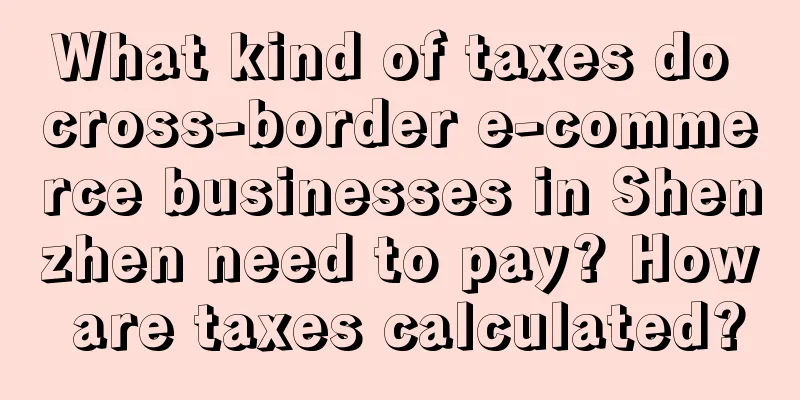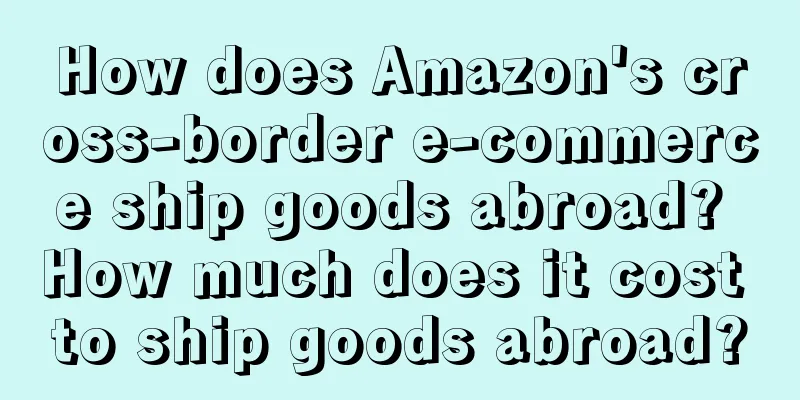What kind of taxes do cross-border e-commerce businesses in Shenzhen need to pay? How are taxes calculated?

|
With the rapid development of China's cross-border e-commerce industry, Shenzhen has become an important cross-border e-commerce center. For enterprises and self-employed individuals engaged in cross-border e-commerce in Shenzhen, it is very important to understand what kind of taxes need to be paid. This article will discuss the types of taxes that cross-border e-commerce in Shenzhen needs to pay and introduce how to calculate taxes. 1. What kind of tax does Shenzhen cross-border e-commerce need to pay? Value Added Tax (VAT): VAT is one of the main taxes that cross-border e-commerce in Shenzhen needs to pay. According to relevant policies, cross-border e-commerce export goods should enjoy tax exemption policies, but imported goods need to pay VAT in accordance with regulations. Tariffs: Tariffs are taxes that must be paid on imported goods, and they also apply to Shenzhen cross-border e-commerce. Tariff rates vary depending on the product category and country of origin. Consumption tax: For certain specific products, such as high-end cosmetics, luxury goods, etc., Shenzhen cross-border e-commerce also needs to pay consumption tax. Consumption tax is determined according to the category and price level of different products. Corporate income tax: For cross-border e-commerce companies registered in Shenzhen, according to the Corporate Income Tax Law, they need to pay corresponding corporate income tax based on their corporate profits. 2. How is tax calculated? VAT calculation: VAT calculation methods vary according to the business type and transaction method of Shenzhen cross-border e-commerce. Generally, the VAT amount to be paid is determined by verifying the transaction invoice and relevant supporting documents based on the specific circumstances of the exported and imported goods. Tariff calculation: Tariff calculation is based on the classification of imported goods and the country of origin. The amount of tariff payable can be calculated by checking the customs declaration form and relevant tariff. Consumption tax calculation: For specific commodities subject to consumption tax, the amount of consumption tax payable is calculated using the corresponding tax rate based on the category and price level of the commodities. Corporate income tax calculation: According to the Corporate Income Tax Law, cross-border e-commerce companies need to calculate and pay corporate income tax based on corporate profits and applicable tax rates. Enterprises and self-employed individuals engaged in cross-border e-commerce in Shenzhen need to understand and comply with relevant tax policies. The main taxes involved include value-added tax, customs duties, consumption tax and corporate income tax. By calculating taxes in compliance, enterprises and self-employed individuals can better avoid risks and lay the foundation for sustainable development. Recommended reading: Which platform should I choose for my personal cross-border e-commerce business? What are the requirements for entry? How much does it cost for personal cross-border e-commerce? Do I need a deposit? Can cross-border e-commerce personal trademarks be registered? What are the regulations? |
Recommend
Can I buy things on eBay and ship them to China? How can I ship them to China?
Ebay is an online shopping website where people fr...
Douyin, Kuaishou and Weibo are full, iQiyi, Youku, Tencent and Mango TV are chasing them. Who will run wild in the short drama industry in 2023?
Today, short dramas are popular. Not only are WeCh...
How many days does Shopee require for delivery? FAQs on Shopee delivery time
For Shopee merchants, delivery is a very basic ope...
What are the most neglected and core skills for ordinary people to start an e-commerce business? 10 cases illustrate
Nowadays, more and more people are engaged in the ...
The Games are over, let’s look at the value of Olympic creativity
With the successful conclusion of the Olympic Game...
Meituan's "Little Wang" removes thorns from Douyin
The upgrade of the "Super Member" system...
After only the refund, the compulsory freight insurance becomes a "powder keg" between the platform and merchants again?
E-commerce platforms strengthen freight management...
From coconut trees to hawthorn trees, why has “male sex marketing” become so popular?
Nowadays, male sex marketing has become the traffi...
Which category should I choose for Temu? Can I change the Temu category after it is decided?
As an emerging e-commerce platform, Temu provides ...
Brand dividend
This article mainly analyzes the eleven elements o...
What should I do if I don't have turnover when opening a personal store on Shopee? What are the requirements for turnover?
Many individuals open stores on the Shopee platfor...
Is there any risk in Amazon daily withdrawal? Is there any handling fee for withdrawal?
Merchants who open stores on Amazon all know the w...
"Plum sauce" is very popular, and brands are using it to take advantage of it to create new marketing methods
Wumeizi sauce is very popular, which brand is the ...
Flying towards the future, meeting new potential - Feilaihui appeared at the 2024 APEC SME Cross-border E-commerce Summit
On March 26, as an ecological partner of DHgate.co...
In order to pay off debts, Zhong Xuegao sold sweet potatoes
Due to the company's operational difficulties,...









